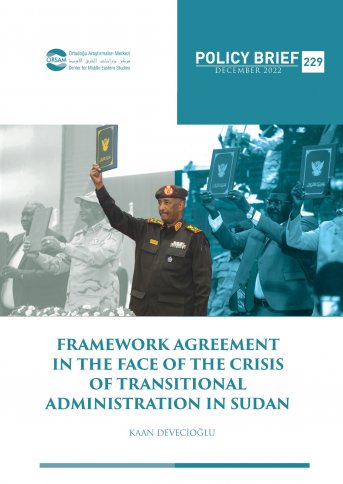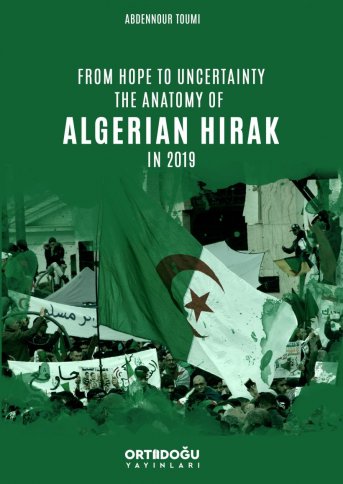
Framework Agreement in the Face of the Crisis of Transitional Administration in Sudan
The protests that started in December 2018 in Sudan against the then-President Omar al-Bashir administration over economic problems and allegations of corruption during his more than 30-year rule lasted for nearly six months, and in April 2019, the Sudanese Army intervened in al-Bashir's rule. The Military Transitional Council, established after the coup, signed an agreement with the groups that organized the protests in August 2019 and established the Sovereignty Council, consisting of six civilians and five soldiers. The names agreed upon by this council were appointed as Ministers. However, none of the issues anticipated for the following period, such as the economic recovery, the establishment of the legislature, or the organization of democratic elections, materialized. Conflicts between civilians and the military deepened during this period, and in October 2021, the military took over the government by force, placing Abdalla Hamdok, the civilian-appointed prime minister, under house arrest. In the following period, the new Sovereignty Council, established under the coordination of the army, ensured that Hamdok was reinstated as the prime minister.
Following the resignation of Abdalla Hamdok as the transitional prime minister, new disagreements emerged both among civilian groups and between civilian groups and the military, deepening the political crisis in Sudan. Thereupon, the United Nations Integrated Transition Assistance Mission in Sudan (UNITAMS) initiated facilitation talks to ensure the fragile democratic transition in the country. During the aforementioned process, at a press conference in Khartoum, UNITAMS Special Representative Volker Perthes stated that the first meetings would include individual consultations between different actors, and the second meetings would be direct or indirect negotiation rounds. Perthes announced that in addition to stakeholders such as the military, rebel groups, political parties, and protest movements in Sudan, civil society and women's groups will be invited to participate in the process. In this context, the Sudanese Professionals Associations (SPA), an activist alliance in anti-Omar al-Bashir rallies, firmly rejected the proposal of this mediation initiative carried out by UNITAMS to normalize relations with the authority of the new sovereignty council in order to resolve the country's political crisis, and the lack of explanation after the launch of the initiatives was noteworthy. In this sense, UNITAMS representative Volker Perthes was attending the briefings at the UN Security Council at regular intervals.
Forces of Freedom and Change (FFC), Sudan's leading civilian opposition coalition, had issued a statement emphasizing its support for any international efforts that contribute to the achievement of the Sudanese people's goals of opposing the coup and restoring a civilian and democratic state. In this context, the negotiations, which started with the coordination of UNITAMS, continued with the roundtable meetings of the Emergency Lawyers, the Doctors and the Journalists Association
In addition, protests by supporters of the troops against the interference of UNITAMS and other foreign actors in Sudan's internal politics continued intermittently. In this regard, although it is stated that the African Union has entered a new process with the contribution of the African Union, the Intergovernmental Authority on Development in East Africa (IGAD), and Eritrea to the UNITAMS negotiations, which caused a new conflict between soldiers and civilians in Sudan, the protesting population continued their demonstrations, demanding complete civilian rule.
After all these developments in a period of about a year, the army administration reconciled with some groups among the civilians with the "Framework Agreement". This reconciliation is an important step towards resolving the political crisis in the country, but the non-participation of some groups is one of the main problems that makes the agreement fragile. From this point of view, this study analyzes the steps taken in the political and security fields envisioned to resolve the political crisis in Sudan, as well as the internal and external actors who participated in the Framework Agreement.







